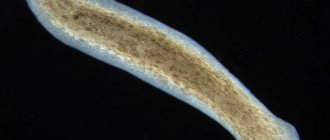Acute respiratory viral infections have many symptoms: runny nose, cough, nasal congestion, headaches, etc. Among all these main signs, there is one that for many seems completely incomprehensible, at least inappropriate for this particular disease - diarrhea due to ARVI, and This unpleasant phenomenon occurs in both children and adults. Why do people experience diarrhea when they have a cold? What symptoms accompany the disease? What treatments will be effective for children and adults? Knowing the answers to these questions is necessary in order to protect yourself from such trouble, and if this has already happened to you, urgent measures are required to treat diarrhea.
Diarrhea due to acute respiratory viral infections is a common phenomenon experienced by both adults and children.
What is ARVI?
Why is diarrhea during ARVI considered far from being the main symptom? Everything is clear here, because ARVI is a viral infection that affects the upper respiratory tract of a person. As a result, symptoms such as:
nasal congestion and runny nose; dry cough; sneezing; sore throat; shortness of breath and chest discomfort.
As a rule, treatment is carried out with various drugs that destroy the viral infection and eliminate the complications of a cold.
Possible complications
Loose stools are rarely a concern for patients. Many believe that it is a reaction to poor-quality food or medications taken in the fight against ARVI, and wait for the symptom to go away on its own. The attitude increases the risk of complications. If vomiting or diarrhea occurs, you should seek medical help. When bowel movements are accompanied by mucus, blood, and the stool is green or black.
Prolonged loss of fluid threatens general weakening of the body, impaired water-salt balance, poor blood circulation, and dehydration. Conditions lead to pathologies of the heart, brain, and central nervous system.
Infections and viruses that have entered the body cause poisoning, and if left untreated, cause acute intoxication. Vital organs and systems suffer.
In the case of small children, sick and elderly people, death cannot be ruled out.
Catching a cold is unpleasant, but does not threaten serious health complications. Simple hypothermia can cause a sore throat, cough, and runny nose. The danger is posed by colds that cause diarrhea and vomiting. Signs of acute viral or infectious infection requiring immediate treatment aimed at suppressing the activity and eliminating dangerous microorganisms. Do not self-medicate, consult a doctor.
There are many types of colds; diseases that cause diarrhea during colds include rotavirus and adenovirus infections. These ailments are characterized by high fever, nausea, runny nose, loose stools, vomiting, etc. The main methods of treatment include drinking plenty of fluids, complete rest, cold compresses and rubbing to reduce the temperature.
There are many types of colds, but almost all of them start the same:
The initial, or post-incubation period, when the disease begins to take effect. Based on the symptoms that develop in the future, it is clear what you are infected with. Almost all colds are viral in nature. During the cold season, viral infections that cause diseases become more active: influenza, rotaviruses and adenoviruses.
Influenza differs from rotavirus and adenovirus infections in that it mainly affects the mucous membranes of the upper respiratory tract and causes general intoxication of the body, but does not have such a symptom as diarrhea. It is characteristic of the other two types of infection.
What is diarrhea?
Diarrhea, popularly called diarrhea, is a pathological condition in which the patient experiences frequent bowel movements. There are many reasons why a person suffers from loose stools:
stomach dysfunction; food poisoning; stress; menstruation and hormonal changes; use of antibiotics and certain medications.
At the same time, loose stools sometimes occur with ARVI, although it seems that these two phenomena are incompatible.
Diarrhea causes disruption of the stomach, which leads to unpleasant symptoms.
Possible complications and prevention
Diarrhea is dangerous due to the high risk of dehydration, which can lead to the development of serious pathologies. ARVI is most often complicated by pharyngitis, laryngitis, tonsillitis and pneumonia. If green mucus appears and your child's diarrhea does not stop, this may indicate complications. The development of such consequences is influenced by improper treatment (carried out at home).
It is impossible to completely protect yourself from viruses. If parents do not want to vaccinate their child, the main prevention of ARVI is isolation from carriers. It is necessary to strengthen the immune system, eat right, walk in the fresh air, and ventilate the room. This will help reduce the chance of infection.
Diarrhea due to respiratory viral diseases is a serious disruption of the body’s functioning that requires immediate correction. This issue is especially acute in relation to infants. You should not try to treat the ailment yourself until your doctor conducts a thorough examination.
The article was approved by the editors
Why does diarrhea occur with ARVI?
Now it’s time to tell you why in some cases there is diarrhea after ARVI. The most basic reason lies in the fact that there is a viral infection in the human body, which is the culprit of all ills, including loose stools.
Diarrhea due to colds can occur for the following reasons:
Pathogenic bacteria affect the digestive system. Viruses cause complete intoxication of the body, resulting in vomiting and diarrhea. A cold greatly weakens a person’s immune system, which is why viruses penetrate the blood, promoting the inflammatory process and poisoning the body with toxic substances.
If you notice certain symptoms of diarrhea, do not rush to lay all the blame on indigestion; perhaps it’s all about a respiratory infection that has entered your body. In this case, consultation with an experienced specialist is necessary.
What ARVI causes diarrhea?
The main causes of diarrhea are diseases of the digestive system, poisoning, long-term treatment with antibiotics, but loose stools can also be accompanied by ARVI, which at first glance seems strange.
Most often, ARVI is accompanied by diarrhea when infected with enterovirus. This is the name given to a large group of pathogens of viral diseases, because more often they initially penetrate the gastrointestinal tract, multiply there, then actively spread throughout the body and cause diseases of any organs, including the respiratory system. Some varieties of enterovirus immediately enter the respiratory system through airborne droplets and are causative agents of respiratory diseases.
Once in the body, enteroviruses can cause several combinations of symptoms. Among others, these may be signs of a flu-like syndrome, damage to the nasopharynx and at the same time nausea and diarrhea.
Enteroviruses have spread throughout the world and represent a huge part of the so-called picornoviruses. Infection occurs through the fecal-oral route, through consumption of contaminated food and water. Residents of countries with low levels of hygiene and a high degree of overpopulation are mainly susceptible to the disease.
Possible consequences
Many people do not take the condition when they have loose stools seriously, believing that this condition will pass and normalize on its own. However, it should be understood that with ARVI, a person may experience vomiting, diarrhea, an increase in body temperature, and other symptoms that do not cause delight.
Diarrhea during ARVI occurs due to the effects of viruses and bacteria on the human body
In addition, prolonged diarrhea will lead to undesirable consequences:
General weakening of the body. Dehydration of the body resulting from loss of fluid. Impaired water-salt balance. Impaired blood circulation.
Subsequently, all this will lead to various diseases of the respiratory system and digestive system. If diarrhea due to colds is not treated, it can cause the development of otitis media, laryngitis, cause shortness of breath, and disturbances in the functioning of the nervous system.
Reasons for the development of the pathological condition
Not every viral respiratory infection can cause diarrhea. Loose stools during colds of a respiratory nature are formed only if the following types of viruses are identified as the causative agents of the cold:
- Stomach flu;
- Adenovirus;
- Flu;
- Rotavirus;
- Enterorvirus.
The liquefaction of stool can occur primarily with an increase in body temperature, as well as during the presence of a high fever. Viruses that can change the normal functioning of the digestive organs and ENT organs can provoke the development of a pathological process in respiratory diseases. Pathogenic bacteria easily penetrate the bloodstream and stimulate the development of acute inflammation in the intestines, which leads to the formation of chronic diarrhea.
If diarrhea and severe vomiting develop with ARVI, then the doctor diagnoses in most cases intestinal poisoning, in other words, viral diarrhea or intestinal flu. Most often, children attending children's institutions, as well as people with low levels or weak immunity are susceptible to infection.
Features of the treatment of diarrhea in adults
Diarrhea due to ARVI in adults is no less common than in children, but each of these cases will require its own treatment methods. In addition to loose stools, adults often suffer at the same time from:
fever; general weakness; nausea and vomiting; apathy towards everything.
Treatment should be prescribed by a professional doctor, since self-medication may result in a worsening of the patient’s condition.
First of all, drugs are prescribed that can kill the viral infection and remove it from the body. It makes no sense to fight loose stools while the virus is inside, because it will continue to act until it is destroyed.
After this, medications are prescribed that prevent dehydration of the body, then directly those medications that help stop loose stools. At the end of treatment, it is advisable to undergo a rehabilitation course to normalize the intestinal flora.
Diarrhea can cause dehydration and requires immediate treatment.
Never take antibiotics on your own, as they can cause serious side effects. Thus, instead of recovery, you can damage your stomach, pancreas or any other internal organ.
Can a cold be accompanied by diarrhea?
Colds can be diagnosed due to their pronounced symptoms. Rarely, they are indicated by indigestion, severe diarrhea and vomiting. The reaction of the gastrointestinal tract to a respiratory disease is caused by the penetration and active activity of viruses that disrupt the functioning of the esophagus, nasopharynx, penetrate into the blood, and cause an acute inflammatory process.
If vomiting and loose stools occur as a result of a cold, intestinal poisoning is possible. The medical condition is called intestinal flu or viral diarrhea. The diarrheal virus has no connection with weather conditions. Young children are at greatest risk of infection. A child swallows microorganisms by putting dirty hands into his mouth after playing with strangers, street toys, or touching dirty surfaces.
The virus can be contained in fresh vegetables and fruits; an adult becomes infected during the cooking process or when choosing fruits during purchase. It is important to pour boiling water over the product or disinfect it before use.
A person with weak immunity experiences swelling of the mucous membranes, fever, vomiting, snot, and diarrhea.
Drugs for treatment
Before moving on to the question of in what cases does diarrhea occur during ARVI in a child, we should mention several effective drugs for the treatment of diarrhea in adults with colds:
Imodium. The product has an antidiarrheal effect, increases the tone of the rectum, and normalizes intestinal function.Linex. A combination drug used for diarrhea, constipation, nausea and vomiting. Favors normal intestinal function and prevents dehydration. Kaopectate. Relieves food intoxication, relieves irritation of the intestinal mucosa.
Of course, you should also take antiviral drugs to eliminate the infection and strengthen the immune system. Esberitox, Echinacea hexal, Immunorm, Immunoplus and others are ideal for this.
Each of the above drugs has its own contraindications and may cause certain side effects, so be careful when taking them to treat diarrhea. It is important to obtain competent advice from specialists, as well as carefully read the instructions for use of the medicine, and only then proceed directly to treatment.
It is important to take medications that strengthen the human immune system
Principles of combating diarrhea due to viruses
If a child develops ARVI and diarrhea, he needs to be helped to cope with all the clinical signs of the disorder. Principles of combating viral infection and dyspepsia:
- replenish the volume of lost fluid - drink filtered water in small quantities, but often;
- remove toxins from the intestines - courses of sorbent drugs, such as Smecta, activated carbon, Filtrum;
- reduce body temperature - antipyretics for children based on Paracetamol, Ibuprofen;
- follow a diet - the menu should contain only easily digestible and fortified dishes.
However, the main efforts should be aimed at the main cause of the disease - suppressing the activity of viral microorganisms. For this purpose, the specialist selects an antiviral drug, taking into account the baby’s age, weight and susceptibility to such therapy.
Self-medication entails a deterioration in the well-being of children and can provoke complications. All prescriptions should be made only by a doctor.
Diarrhea due to ARVI in children
It’s one thing when an adult experiences similar symptoms, and completely different when there is diarrhea due to ARVI in children. For young children, an upset stomach is not just an unpleasant, but also an extremely dangerous symptom, because high fever and loose stools can quickly cause dehydration.
Loose stools during ARVI in a child are accompanied by other signs:
lacrimation or, conversely, tearless crying; general weakness and lethargy, apathy; rare urination; dry mouth; nausea and vomiting.
Dehydration is difficult to treat and must be prevented. Diarrhea during acute respiratory infections and acute respiratory viral infections is a sign of acute intoxication of the body, which requires immediate treatment.
If you do not know what to do in such a situation, seek immediate medical help so that you can take the right steps to treat the disease.
It is especially scary when loose stools are observed in infants and infants, because in such situations it is important to approach the solution of the problem as responsibly as possible. Do not take any action without consulting your doctor, as any wrong action can lead to dire consequences.
Diarrhea due to ARVI in children is a fairly common symptom that requires treatment.
Is there any poisoning here?
The virus, having penetrated the gastrointestinal tract, begins to multiply rapidly and in a very short time causes diarrhea in a person, followed by dehydration. But dehydration is a common symptom of diarrhea and poisoning, so it cannot be considered a differential sign.
To suspect a viral infection, you need to pay attention to clinical signs in which symptoms resembling a flu-like state and acute inflammation in the intestines are simultaneously observed:
- heat;
- cough;
- white coating on the tongue;
- nasal congestion and redness;
- incessant rumbling in the stomach;
- pain when swallowing;
- loss of appetite;
- inflammation of the conjunctiva;
- nausea, vomiting;
- general weakness.
Diarrhea in infants due to a cold
Diarrhea in a baby due to ARVI is a common phenomenon, but it is so frightening that no mother will get used to it, no matter how often this symptom is observed.
The fact is that diarrhea significantly weakens the baby’s body and leads to dehydration. It is not recommended to give your child a lot of water, as it can cause vomiting. In such situations, experts recommend doing the following:
Give your baby water in small portions, but more often than usual. Under no circumstances give the same medications for diarrhea that you can give to an adult child, and especially to an adult. Be sure to call a doctor at home, because only an experienced specialist will determine accurate diagnosis of why the child has loose stools.
Remember that treatment of ARVI with diarrhea should be carried out under the supervision of a doctor . It is important to treat a cold, and for this you need:
Do not force the baby to eat, let him suck as much milk as he wants at the moment. Give clean and boiled water. Constantly stay close to the baby, hold him in your arms more often. Mucus from a runny nose should be removed using a special pear-shaped bottle. You can give your child a cough and runny nose mixture, but only after consulting with your doctor.
All efforts should be aimed at not only stopping diarrhea in infants, but also getting rid of a respiratory infection.
With colds, diarrhea can occur even in infants
Additional diagnostics
To make a final diagnosis, the doctor needs to determine the cause of the disease. And laboratory research methods will help him with this. Depending on the clinical picture, the doctor will refer the child to the following procedures:
General blood and urine tests. Blood biochemistry (electrolytes, acute phase parameters, liver and kidney tests). Swab or rinse from the nose and throat (microscopy, culture, PCR). Serological analysis (increase in titers of specific antibodies in paired sera). Coprogram. Stool culture tank.
It is necessary to differentiate infectious diseases from other pathologies: allergies, chronic inflammatory bowel diseases and fermentopathies. This requires an appropriate diagnostic program and consultations with related specialists: an immunologist-allergist, a gastroenterologist.
Why do children have diarrhea with ARVI?
The main reasons why people experience loose stools during colds have already been listed above. Now the specific reasons for the appearance of this symptom in children will be listed:
The use of antibiotics that destroy beneficial intestinal microflora. Reaction to teething in young children. Rotovirus infection. Weakened immunity.
In addition, children experience other symptoms that adults do not:
Rhinitis. Ear pain. Conjunctivitis. Severe cough. Redness of the eyes and tongue.
All these signs indicate that the child is sick with ARVI, and urgent measures are required to treat it.
Diarrhea after ARVI in a child can be cured in a short period of time; the main thing is to adhere to the basic rules of treatment and not take actions that could worsen the situation.
It is important to seek help from a qualified pediatrician
Reasons for the development of the pathological condition
Not every viral respiratory infection can cause diarrhea. Loose stools during colds of a respiratory nature are formed only if the following types of viruses are identified as the causative agents of the cold:
- Stomach flu;
- Adenovirus;
- Flu;
- Rotavirus;
- Enterorvirus.
The liquefaction of stool can occur primarily with an increase in body temperature, as well as during the presence of a high fever. Viruses that can change the normal functioning of the digestive organs and ENT organs can provoke the development of a pathological process in respiratory diseases. Pathogenic bacteria easily penetrate the bloodstream and stimulate the development of acute inflammation in the intestines, which leads to the formation of chronic diarrhea.
If diarrhea and severe vomiting develop with ARVI, then the doctor diagnoses in most cases intestinal poisoning, in other words, viral diarrhea or intestinal flu. Most often, children attending children's institutions, as well as people with low levels or weak immunity are susceptible to infection.
How to treat?
How to treat diarrhea with fever due to ARVI in a child? This is the most pressing issue that needs more detailed consideration.
Initially, the doctor may prescribe Derinat or another drug with a similar effect. Derinat stimulates tissue regeneration, strengthens the immune system, and removes infection from the child’s body. Triglobulin. A medicinal powder that is used to treat intestinal infections in newborns. Bifiform. Used to treat adults and children, intended to restore intestinal functions. Oralit. Used to restore energy balance, necessary to prevent the process of dehydration. Mezim. An effective medicine for diarrhea, which occurs with ARVI. Pancreatin. Improves digestion, helps restore intestinal flora. Laktovit-Forte. This is a well-known probiotic that can restore intestinal function and protect the body from the penetration of dangerous bacteria.
Antibiotics are extremely rarely prescribed in this situation. Never self-medicate your child, because this can end very badly for his health.
Principles of therapy
If signs of ARVI appear, you should contact your family therapist. As a rule, treatment for adults is carried out on an outpatient basis. Young children, especially those with diarrhea, may require hospitalization. At the same time, the recovery process depends not only on the medications used, but also on compliance with the regimen.
Drug treatment
There is no etiotropic treatment for ARVI, as well as for rotavirus infection. That is, there is no medicine that could destroy the virus. All kinds of antibacterial and antiviral agents are ineffective in this case. However, doctors are able to combat intoxication and dehydration caused by infection.
As a rule, if diarrhea occurs during ARVI in adults, it is one-time. Diarrhea in this case does not require the use of antidiarrheal drugs. In children, diarrhea can lead to severe dehydration. Therefore, if rotavirus infection is suspected, treatment with sorbents (Enterosgel, Smecta) is indicated. These medications help remove toxins from the child's body.
To replenish fluid, children are prescribed oral rehydration agents (Oralit, Trihydron). In severe cases, parenteral rehydration is carried out with intravenous administration of saline solutions (Acesol, Disol, etc.).
Also, to make you feel better, your doctor may prescribe nasal drops, throat antiseptics in the form of sprays or lozenges, and cough suppressants. When the body temperature is above 39 degrees, the use of antipyretics (Paracetamol, Ibuprofen) is indicated.
Sometimes it happens that a person begins to experience diarrhea after an acute respiratory viral infection. In this case, we can assume that this is the body’s reaction to the drugs used. Especially if a person self-medicated during a respiratory infection and used antibacterial agents. Probiotics (Linex, Bifiform, etc.) will help restore intestinal function.
Prevention
Viruses are easily transmitted from person to person, especially for children who play with each other and are constantly in close contact with other children. Preventive measures do not imply isolating the child from other children and confining him to a separate room, but it is important to listen to the following recommendations:
It is necessary to dress the child according to the weather so that he does not become overcooled, but so that he is not too hot. During the cold period of the year, you can take a course of immunomodulatory drugs. It is necessary to rinse the child’s nose more often, especially if you notice the first signs of a cold. Ventilate the apartment even in cold weather months of the year so that viruses cannot spread in a living room. If children begin to vomit and have diarrhea due to ARVI, they should seek medical help; there is nothing scary or embarrassing about it.
It is necessary to learn how to properly rinse children's noses to prevent colds.
Remember that both children and adults experience this symptom. You should not be surprised by this, because the human body is susceptible to the negative effects of many viral infections. All that is required of you is to take immediate measures to destroy bacteria and dangerous microorganisms, after which the diarrhea will go away on its own.
ARVI is translated as acute respiratory viral infections. People call them common colds. This type of disease is one of the most common and occurs in adults and young patients. ARVI is divided into several subtypes, some of which cause the development of diarrhea in adults and children.
Diarrhea with ARVI occurs:
with influenza infection; with intestinal flu; with adenovirus infection; with reovirus infection; with enterovirus infection; with a severe fever.
Causes and mechanisms
Diarrhea can have different origins. If a child’s stool appears more often than usual and becomes liquid, then the reason is hidden both in the intestine itself and outside it. The general mechanisms of this phenomenon are associated with hypersecretion of fluid by the cells of the small intestine, impaired absorption of nutrients, or accelerated peristalsis. They are also involved in situations where diarrhea is observed against the background of a cold. But there are some nuances here.
Let us first consider cases that do not cause alarm. For example, if your baby is teething, symptoms typical of a cold may appear: snot and a slight increase in temperature. The secretion of saliva increases, which sometimes causes vomiting and even loose stools. But these phenomena are not observed in all children; they are short-lived and disappear completely after teething.
But diarrhea often becomes a sign of an infectious pathology, which requires a more serious attitude towards the child’s health. When diarrhea is combined with a cold, you most often have to think about the following conditions:
General intoxication syndrome. Rotavirus infection. Enterovirus infection.
We should not forget that increased frequency of stools may even be a separate symptom that has nothing to do with catarrhal phenomena in the upper respiratory tract. Therefore, the likelihood of concomitant conditions should also be considered. Colds are often combined with diarrhea in infants due to changes in diet. But it is extremely important to exclude other diseases associated with the gastrointestinal tract:
Infections (salmonellosis, dysentery, yersiniosis, etc.). Enzyme deficiency. Dysbacteriosis.
Diarrhea can also occur with food allergies, and at an older age you should think about a chronic pathology, for example, Crohn's disease. And in adults, it is also necessary to exclude pancreatitis, liver and gallbladder diseases. So the range of conditions requiring exclusion is quite large. Only a doctor can make a correct diagnosis, so parents should seek medical help at the first alarming symptoms.
The development of diarrhea due to a cold is a fairly common phenomenon. But the connection between the two conditions still needs to be confirmed.
Flu diarrhea
Influenza infection differs from other types of colds in that it leads to severe intoxication of the body. In particular, this process adversely affects the children's body. A cold usually affects only the respiratory tract. But with the flu, the human body suffers as a whole. In this case, the disease begins quite acutely, and the symptoms develop at enormous speed. Once the flu enters the body, after a few hours it begins to rapidly manifest itself.
The main symptoms are generally considered to be the following.
Temperature rises to 39-40 degrees. The appearance of nasal congestion. Manifestation of severe pain in the head. Watery eyes. The cough is debilitating and dry. The occurrence of painful sensations behind the sternum. Redness and swelling of the mucous membranes of the eyes, nose and mouth.
If a patient develops swine or bird flu, other symptoms such as abdominal pain, nausea, vomiting and diarrhea occur. In this case, vomit and feces are watery in nature without any admixture of blood or bile.
Diarrhea due to fever
In children, especially young children, a sharp increase in body temperature and intoxication during the acute period of acute respiratory viral infection can provoke a malfunction of the gastrointestinal tract.
In this case, the child feels sick and refuses to eat. There may be vomiting or diarrhea. Please note that in this case, vomiting and diarrhea are one-time, less often twice, and the child’s stomach does not hurt. If the urge is frequent and is accompanied by pain in the stomach or intestines, it is necessary to determine their cause and begin treatment. Do not give the patient any medications until the ambulance arrives, do not rinse the stomach with potassium permanganate. You can drink clean water and also take a sorbent (for example, activated carbon).
Diarrhea during a cold, as a rule, manifests itself against the background of poor general health and the presence of high temperature - signs that are attributed to ARVI can also become a signal of infection in the gastrointestinal tract.
Diarrhea due to rotavirus infection
Rotavirus infection is a highly contagious disease and is often found in preschool institutions. It affects not only children's bodies, but also adults. The virus is transmitted through household, airborne and fecal-oral routes. This affects not only the respiratory tract, but also the digestive system.
In practice, rotavirus infection is usually called intestinal flu. Statistics have also been revealed that rotavirus is most common in late summer. The disease is characterized by:
temperature rise to 38 degrees; painful sensations in the abdomen; nausea and vomiting; manifestations of cough, runny nose and sore throat.
Diarrhea due to ARVI in a child has a liquid consistency and a yellowish tint. Adults tolerate the disease much more easily, so they usually experience digestive upset.
Rotavirus infection is contagious. Therefore, if at least one of the family members is sick, then you should carefully observe hygiene measures. It is necessary to regularly wash your hands with soap, carry out wet cleaning with disinfectants and thoroughly wash the dishes. Antibacterial agents are powerless for such an infection, since the disease is caused by a virus.
There is no specific treatment for rotavirus. But it is worth remembering that with high fever and diarrhea, dehydration occurs. Especially during such a process, it is worth taking care of children, because this can end in dire consequences.
Diarrhea due to a cold must be treated with sorbents. They retain nutrients and prevent the body from becoming too weak. These include activated carbon, Enterosgel, Smecta. To replenish the water balance in the body, you should drink a lot of water.
Nausea and vomiting in adults and children can also occur with other diseases. Therefore, rotavirus can be easily confused with an intestinal infection.
Symptoms
Each disease begins to be diagnosed with clinical symptoms. To do this, the doctor conducts a survey, paying attention to information received from the parents and the child himself. Complaints are detailed and supplemented by physical examination data: examination, palpation of the abdomen. And based on the information received, a preliminary conclusion is made.
General intoxication syndrome
Intoxication in children most often has a viral-bacterial origin, but the chemical nature of the changes cannot be ruled out. The body reacts to the entry of a foreign agent into it by activating its defenses, which can manifest itself in different ways. In particular, there is nausea and vomiting, increased intestinal motility (diarrhea).
General intoxication syndrome is very often observed with respiratory diseases, such as influenza. This is an infection that affects not only the respiratory tract. The virus has a pronounced toxic effect on the nervous and vascular system. Therefore, the main symptoms of the disease will be the following:
Fever. Headache. Aches in the body (muscles, bones). Redness and puffiness of the face. Dilatation of scleral vessels (injection).
Catarrhal phenomena are also present. At first the nose is stuffy, but then watery mucus comes out of it. The throat hurts infrequently, but a dry cough is typical. Damage to the respiratory tract can result in bronchitis or pneumonia. But the toxic effect on the body in a number of patients is manifested by pulmonary edema, encephalopathy, and glomerulonephritis.
Rotavirus infection
Most often, when diarrhea appears against the background of cold symptoms, they think about rotavirus infection. The disease affects the digestive tract, which is why it is nicknamed “intestinal” or “stomach” flu. The infection is transmitted by the fecal-oral route (with food, water) or by airborne droplets. First, a prodromal period occurs, in which there will be the following signs:
Cough and runny nose. Redness of the throat mucosa. Fever. Weakness and malaise. Nausea and vomiting.
Young children become capricious and lethargic and refuse to eat. The virus then enters the intestines, where it multiplies, causing damage to the digestive system. Diarrhea is observed due to increased cellular secretion and bloating. The feces become grayish-yellow in color, and the urine darkens. The illness lasts about a week.
The so-called intestinal flu is a very common cause of diarrhea that occurs against the background of cold symptoms.
Enterovirus infection
Another infection that fits the description is enterovirus. It is most often caused by the Coxsackie and ECHO viruses, which are transmitted through food, water or household items. The disease in adults and children can have a lot of variations and corresponding clinical manifestations. Among them it is worth noting the following:
Fever. Pharyngitis with tonsillitis. Herpetic sore throat. Abdominal pain. Dyspepsia (nausea and vomiting, diarrhea). Meningeal syndrome. Skin rash (exanthema).
Enteroviral diarrhea most often affects young children. The onset of the disease is acute. The first symptom is fever with abdominal pain, vomiting and diarrhea. The abdomen is swollen, peristalsis is increased. Stools become more frequent up to 5–7 times a day; they become profuse, watery, and greenish-yellow in color. With great consistency, signs of damage to the upper respiratory tract are detected: redness of the soft palate, arches and uvula, pharyngitis.
Diarrhea with adenoviral enteritis
Adenoviral infection can affect any area in the body, so this disease is characterized by various symptoms.
If diarrhea during a cold in an adult is caused by the activity of adenoviruses, then other symptoms are observed. Increasing temperature indicators to 38 degrees. Enlarged and painful lymph nodes. Manifestation of pain in the head. Weakness and general malaise. Abdominal pain and diarrhea. Redness and swelling of the tonsils. Severe runny nose.
In addition to all this, adenovirus can cause cough, conjunctivitis, cystitis and inflammation in the brain. Most often, this infection occurs in children under six years of age, and infection occurs through airborne droplets, household and oral-fecal routes.
Causes
With loose stools and severe symptoms of a respiratory infection, patients wonder whether diarrhea occurs with a cold? This problem often occurs in childhood, since the immunity of children is much weaker. The gastrointestinal tract reacts to viruses that infect the nasopharynx and respiratory organs. Penetrating into the bloodstream, they cause inflammation and disrupt intestinal function. A cold suppresses protective functions, which leads to poisoning of the body.
The reasons that cause diarrhea when a baby has a cold include:
- Suppressed immunity , undermined by congenital pathologies, prematurity.
- Teething , often accompanied by fever, runny nose, drooling, and diarrhea.
- Use of antibiotics . A runny nose and diarrhea here indicate a change in the natural intestinal microflora. The baby needs restorative therapy.
Especially often the cause of the pathological process is:
- Human respiratory syncytial virus infection, predominantly affecting the lower respiratory tract. It often provokes the development of bronchitis and pneumonia.
- Adenoviral infection that affects lymphoid tissues and the mucous membrane of the upper respiratory tract.
Diarrhea develops with ARVI in adults, when the disease is accompanied by fever, chills, and temperature.
Respiratory syncytial infection
This virus quickly dies when boiled and under the influence of disinfectants. But it survives at low temperatures, especially when it is in droplets of mucus. Diarrhea due to a cold caused by an MS infection is often observed in children under one year of age. In adults, the main symptoms of the pathological process appear 5-7 days after the end of the incubation period:
- Pain in the temples, forehead, and back of the head.
- Low-grade body temperature up to 38°C.
- Chills.
- Body aches.
- Decreased performance.
- Conjunctivitis.
Subsequently, signs of inflammation in the respiratory organs appear: cough and runny nose, irritation of the mucous membranes of the pharynx and nose. In severe cases, the disease is accompanied by:
Adenovirus
This infection is quite stable in the external environment. The place of its penetration is the upper respiratory tract, eyes, intestines, lymphatic tissue. You can become infected with adenovirus in the following ways:
- Upon contact with a sick person.
- By air.
- Through dirty hands.
Colds caused by adenovirus infection in adults and children cause diarrhea, as well as:
- Temperature.
- Malaise, lethargy, powerlessness.
- Lymphadenopathy.
- Conjunctivitis.
- Redness of the throat.
- Runny nose.
- Spasms in the abdominal area.
The patient should seek medical help at the first signs of illness. In the absence of proper treatment, diarrhea in an adult due to a cold can significantly weaken the body, which is fraught with the appearance of neurological, urological, and infectious pathologies.
Diarrhea due to a feverish state of the body
Vomiting in an adult and a child with diarrhea can occur due to severe intoxication of the body. If this is not an intestinal infection, then these symptoms will manifest themselves once, in rare cases twice. After this, the patient feels relief, and the stomach stops hurting.
This condition can occur due to the appearance of a febrile state, when the temperature rises sharply. The body does not have time to cope with the infection, as a result of which it affects all organs.
But you shouldn’t carry out the treatment process yourself. Only a doctor, after examination and diagnosis, can make an accurate diagnosis.
IMODIUM® in the treatment of diarrhea
IMODIUM® 2 can be used as an auxiliary drug for diarrhea of infectious origin. This well-studied drug, which has undergone numerous clinical studies, contains loperamide. The active substance can help eliminate diarrhea syndrome and normalize intestinal motility. IMODIUM® is available in the form of lozenges that dissolve in the mouth in just 2-3 seconds. The drug does not require drinking water and can begin to act within an hour after administration 3 . IMODIUM® tablets have a pleasant mint taste. The drug is suitable for the symptomatic treatment of diarrhea in adults and children over 6 years of age 2. Before use, you should consult your doctor and read the instructions.
This material is advisory in nature and does not replace consulting a doctor.
1 D. V. Usenko, Doctor of Medical Sciences, E. A. Gorelova, Candidate of Medical Sciences Acute intestinal infections of viral etiology in children: possibilities of diagnosis and therapy. Central Research Institute of Epidemiology of Rospotrebnadzor. Moscow.
2 In accordance with the instructions for medical use of the drug IMODIUM®.
3 Study by Ameri et al. Multicenter, double-blind study: comparing the effectiveness of loperamide for acute diarrhea with two popular antidiarrheal agents and placebo. 1975.
Recommendations during the treatment of diarrhea due to ARVI
ARVI in adults rarely occurs with nausea and vomiting. The only thing that can complement the symptoms is diarrhea. As soon as the causes of vomiting, nausea and diarrhea are identified in acute respiratory infections, it is necessary to begin medical therapy. In severe cases, the patient may be sent to hospital.
At home treatment includes the following.
Drinking large amounts of liquid. The patient can drink water, rice water or raisin compote. If the baby refuses to drink, then you need to give him one spoonful of water every ten minutes. Reception of sorbents. Usually, in childhood, doctors advise taking Smecta or Enterosgel. Adults can resort to activated or white carbon, Filtrum. Taking antipyretic drugs. This measure is carried out only if the patient’s temperature rises above 38 degrees. Children are prescribed Paracetamol and Ibuprofen in syrup or Cefekon in suppositories, and adults are prescribed paracetamol, aspirin or analgin in tablets. Use of antiviral agents. Since any type of cold is caused by viruses, it is necessary to take this type of medication. This will allow you to quickly overcome the infection and reduce the manifestation of symptoms. Maintaining bed rest. The patient needs to lie down for three to five days until the temperature drops and health improves. Following a strict diet. This point is one of the most important. The patient should completely exclude from the diet all dairy and fermented milk products, baked goods, caffeine-containing drinks, meat and fish products, vegetable and fruit dishes, and alcohol.
After diarrhea and vomiting in adults and children have stopped, you can consume: low concentration chicken broth; Rye bread; salty cracker-shaped cookies; boiled rice; mashed potatoes. When the diarrhea completely passes and the stool returns to normal, you can include bananas, chicken and baked fish in your diet.
The use of drugs that restore intestinal microflora. Doctors prescribe Hilak, Laktovit-Forte. Taking probiotics in the form of Linex, Normabact or Bifiform. Taking enzymes to improve the functioning of the pancreas in the form of Festal, Mezim.
Treatment
ARVI and diarrhea are frequent companions of each other. You can choose a treatment system for a disease by identifying the causes and causative agents of the pathology. Observing symptoms of a viral infection with abnormal bowel movements requires visiting or calling a doctor. A specialist usually prescribes home treatment, prescribing a list of medications and bed rest.
Home methods to combat pathology include a list of important actions:
- drinking large volumes of liquid. In addition to water, rice water and rosehip drink are also suitable. A popular and effective remedy is Regidron solution. Sweet liquids are contraindicated. Drinks should be consumed in small sips after each bowel movement;
- take sorbents. If a child has diarrhea, you can drink, for example, Smecta;
- drink an antipyretic at a temperature above 38 degrees. Effective remedies are Paracetamol, Aspirin, Ibuprofen;
- use of antiviral medications. Prescribed by a doctor only if the cause of the disease is viruses;
- bed rest. Calm treatment is most effective for adults and children. With such a regime, there is less load on the body, which focuses on the fight against pathogenic infectious agents;
- getting rid of diarrhea in adults and children requires a strict diet;
- take medications containing enzymes;
- drink probiotics;
- take medications that restore intestinal microflora.
Treatment of childhood diarrhea
Children are the most vulnerable category to infections and viruses. Frequent cases of infection in children are oral-fecal. The disease poses a particular danger to newborn babies. Diarrhea in infants due to ARVI is accompanied by severe dehydration. Infants should not be given increased amounts of liquid.
Treatment of diarrhea in a young child involves the following steps:
- Give your baby small, frequent portions of water. The liquid must be clean and boiled.
- Call a doctor.
Important! Never give your baby adult medications.
Treatments for diarrhea and ARVI rarely include antibiotics. The most popular drugs are those that contain a minimum of side effects. These include: Pancreatin, Mezim, Bifiform, Oralit, Derinat, Laktovit-Forte. Self-prescribing medications for children is contraindicated. Even taking usual medications requires a reduced dosage.
Therapy for diarrhea in adults
Colds in adults caused by viruses are quite severe. The likelihood of contracting an infection is high through airborne droplets. There is a clear loss of strength and apathy. The patient must remain in bed for several days (from three to a week).
Recognizing cold symptoms requires medical attention. Self-medication can make the situation worse. Treatment of ARVI with diarrhea requires complex measures. For adults, the range of medications is wider than for children. Sorbents are often prescribed similar to children's treatment. In rare cases, antibiotics are prescribed.
A strict diet involves, first of all, avoiding alcoholic beverages and hard-to-digest, heavy foods. In adults with a cold, diarrhea usually goes away 3-4 days after the start of therapy.
We recommend: How to stop diarrhea after chemotherapy?
Folk remedies
The older generation almost always prefers non-drug remedies, that’s a fact. Since ancient times, before the invention of tablets, all ailments were treated with medicinal plants and certain products. Two folk recipes are especially popular: rice water and strong sweet tea with breadcrumbs on an empty stomach.
They are considered to be universal for all cases of diarrhea. Sometimes you can hear advice that vodka with salt or a few peppercorns works great for diarrhea during ARVI in adults, but from a medical point of view, such a recipe threatens health. It is better to choose one of the following remedies.
Plantain
Famous for its expectorant properties. Many cough syrups contain plantain extract. But the plant also helps equally well with diarrhea, colitis, enterocolitis, and gastritis. The juice of fresh leaves contains astringents and anti-inflammatory substances. To prepare a medicine that stops diarrhea, plantain along with its cuttings are scalded with boiling water and squeezed well through gauze. Then you need to drink a tablespoon before meals 3 times a day, diluting it in half with water before use.
Collection of St. John's wort, chamomile, sage
Herbs have a powerful anti-inflammatory effect, suppress the activity of viruses and bacteria, and normalize intestinal activity. If you have loose stools due to a cold, it is enough to drink the mixture for 1-2 days. It is prepared as follows: mix 3 parts chamomile, 2 St. John's wort, 1 sage in a dry container, take a teaspoon of the mixture and brew 200 ml of boiling water. Take warm instead of tea 2 to 4 times a day.
The fruits of the plant have immunostimulating, anti-inflammatory, antipyretic and bactericidal effects. In addition, bird cherry knits, that is, it stops diarrhea. Recipe for a medicinal decoction: pour 2 tablespoons of fruits into 500 ml of water, place in a water bath for 15 minutes. Let it brew for about an hour, then strain. Drink the product warm, 100 ml 3-4 times a day.
Revitalizing vitamin drink
The state of immunity directly affects the course of the disease. To increase the body's resistance to illness, it is recommended to enrich the diet with vitamins. The following recipe is especially good for restoring strength: crush 150 g of rose hips, add 1 liter of water, cook for 15 minutes, then immediately add 1 sliced lemon, 2 tablespoons of grated ginger root, a handful of raisins. After cooling, strain the drink through cheesecloth into 5-7 layers, sweeten with 50g of honey. Drink 100 ml throughout the day.
The opinion that diarrhea occurs only due to poisoning is fundamentally incorrect. Respiratory viruses can infect the intestines, but this happens under certain conditions: good strain viability, microflora imbalance, chronic diseases of the digestive system, reduced immunity. This is the answer to the question whether diarrhea can occur with ARVI. Be that as it may, if the disorder begins in a child, you need to give him water more often, and contact your pediatrician for prescription medications. The onset of diarrhea against the background of ARVI in adults is not so dangerous. In the first 2 days, you can try to heal on your own. If there is no improvement, you need to go to a therapist, gastroenterologist or infectious disease specialist.
Viruses that cause diarrhea
For most people, ARVI is associated with a cough, runny nose and high fever. If the symptoms are acute, the malaise is called the flu; if they are mild, it is called a cold. There are a lot of viruses, each with characteristic symptoms. The most common are influenza, rotavirus and adenovirus.
Influenza is considered the most aggressive virus of all acute respiratory viral infections. Influenza was first isolated in 1930. There are currently about 2,000 known strains of influenza. It is common to call any respiratory viral disease the flu. This judgment is erroneous; in addition to influenza, there are 200 more subtypes of infections characterized by similar symptoms. The virus is one of those that can cause intestinal upset. The influenza condition can be distinguished by some characteristic signs. The flu begins acutely - with high fever, headache, weakness throughout the body. The child may develop a cough, runny nose and diarrhea. Symptoms come on suddenly and get worse quickly. When diarrhea occurs, influenza stool has a watery structure. The urge to defecate is frequent - from 5 to 8 times a day. As you recover, the symptoms weaken and disappear.
Differences between viral diarrhea and poisoning
Diarrhea in combination with cough is characteristic not only of ARVI. Similar symptoms occur with allergies, helminthic infestations, and reflux disease in an adult. Loose stools and coughing in a child under 2 years of age may be a sign of new teeth growing. Swelling at the site of eruption stimulates increased secretion of mucus, which, when swallowed, often causes coughing and increases intestinal motility.
Diarrhea is often a consequence of intoxication during ARVI - general poisoning of the body with waste products of viruses and its own damaged cells. In this case, the body temperature inevitably rises. As for foodborne illness (poisoning from spoiled foods), viral diarrhea has several differences:
- contagiousness: several people suffer from food poisoning only if they ate from a common table;
- smell and consistency of stool: diarrhea during a cold is characterized by frequent bowel movements, while in case of poisoning, stool also smells bad, contains mucus, undigested food, the patient experiences a false urge to defecate;
- swelling of the mucous membrane, nasal discharge, cough: in case of food poisoning, the upper respiratory tract is not affected, cough can only occur as a result of vomiting, with severe nausea.
The main danger of any diarrhea is dehydration. The rapid removal of water from the body along with feces entails disruption of the functioning of all organs. Therefore, from the first hours of the disorder, without waiting for a diagnosis, you need to start drinking a lot. It is best in small volumes, but often. A rehydration solution is especially good at preventing dehydration: 1 liter of boiled water, a teaspoon of salt, 2 tablespoons of sugar, a pinch of soda (WHO recipe)
If it is difficult to make a diagnosis, the patient is prescribed tests: complete blood count, stool culture for microflora, ultrasound. If diarrhea develops against the background of a viral infection, first of all, treat the underlying disease. The treatment regimen is drawn up for each case separately. What drugs are prescribed to eliminate diarrhea during ARVI in adults:
- antimicrobial drugs with local intestinal action: Enterofuril Nifuroxazide, Stopdiar;
- antiviral drugs, immunostimulants: Echinacea, Derinat, Viferon, Groprinosin;
- sorbents: Activated carbon, Polysorb, Smecta, Atoxyl;
- rehydration mixtures: Gastrolit, Regidron, Orsol, Humana Electrolyte;
- antispasmodics and painkillers: Spasmolgon, No-shpa, Paracetamol;
- enzymes to improve digestion: Pancreatin, Creon;
- probiotics to restore intestinal microflora: Hilak, Bifiform, Linex.
Additionally, treatment is carried out with cough medicines in tablets and sprays (Strepsils, Faringosept, alcohol Chlorophyllipt). For difficult expectoration, mucolytic drugs Bromhexidine, Lazolvan, Ambroxol, syrups with plantain, and licorice root are prescribed. If there is a runny nose, vasoconstrictor sprays Tizin, Nazivin, Sanorin, Pinosol are used to restore nasal breathing. At temperatures above 38.5 degrees, take antipyretic Paracetamol, Panadol, Ibuprofen.
Broad-spectrum antibacterial drugs are not used for viral diarrhea. Their use is justified if a secondary bacterial infection is associated with a cold. Otherwise, diarrhea may increase as a result of disturbances in the intestinal microflora (dysbacteriosis). Diarrhea after ARVI is a common consequence of unjustified use of antibiotics.
General recommendations
For your health to quickly return to normal, taking medications alone is not enough. During illness, it is more important than ever to eat right and maintain good personal hygiene. Doctors' recommendations for ARVI with diarrhea:
- bed rest in the first days of illness, isolation from other family members;
- wet cleaning 1–2 times a day;
- ventilate the room every 3–4 hours;
- drinking regime with a fluid volume of 2 liters or more per day;
- dietary food with a predominance of warm, boiled, grated food;
- taking vitamins and minerals (ascorbic acid, potassium, magnesium, calcium);
- exclusion from the diet of fresh fruits and vegetables, fatty, smoked, spicy, carbonated, coffee.
To avoid repeated cases of illness, you should thoroughly wash your hands after going outside and before eating. Children should be taught from an early age that they should not touch their face with unwashed hands, and especially their mouth, eyes and nose - the main entry points for infection. For strong immunity, it is important to lead a healthy lifestyle and harden yourself. During outbreaks of ARVI in the region of residence, you should avoid visiting crowded places and, if possible, stay at home.
If your child has diarrhea
Children's bodies are not yet fully formed and poorly protected. That is why they are more susceptible to respiratory infections and disruptions in the digestive system. But what’s much worse is that complications of diseases occur more often in childhood. Common diarrhea can be fatal in a fairly short time. Therefore, only a doctor should treat a child up to one year old. Before his arrival, plenty of fluids, rehydration mixtures and rest are allowed.
Children of preschool and school age are treated in the same way as adults. The only thing is that I often prescribe drugs that stimulate the immune system and antivirals. They help contain the proliferation of pathogenic agents, and thereby reduce the risk of complications. Particular attention is paid to the child’s nutrition during illness, as well as during the recovery period. Parents should not insist on eating if there is no appetite. The body spends a lot of energy digesting food, but now it is much more important to fight the infection.
You should not give medications to your child at random, without a prescription from a specialist. Such experiments often do not help, or even end in failure.
Associated symptoms
ARVI or acute respiratory viral infection is a disease that occurs as a result of a pathogen entering the body. The main symptoms that identify ARVI are:
- a sharp increase in body temperature to 38-40°C;
- runny nose;
- red throat;
- burning in the nose and throat;
- tearfulness;
- irritation or pain in the throat and larynx;
- dry cough;
- aching joints;
- weakness, lethargy, fatigue;
- Strong headache;
- apathy;
- lack of appetite.
Viral infections are transmitted to a healthy person from a carrier. The pathogen invades the “new host” through the respiratory tract, and symptoms of the disease manifest themselves in the form of a runny nose or sore throat. Next, snot and cough appear - a response function, an attempt to remove a foreign pathogen from the body. The immune system reacts to viral particles by raising body temperature. At 38°C, the body begins to produce interferon, a special protein that makes the body’s cells immune to the virus. Doctors do not recommend lowering the temperature below 38.5 (except for special reactions of the body). The highest concentration of interferon is usually produced on day 3 of the disease.
In certain cases, during the development of a viral disease, the child exhibits symptoms of an intestinal disorder. The feces liquefy and acquire an unusual (usually greenish) color, consistency, and smell. Sometimes there are particles of undigested food, mucus or foam in the stool. The child has diarrhea, may experience abdominal pain, begins to feel sick, and vomits. More often, the development of this condition is caused by certain types of ARVI. Parents need to be especially careful if similar symptoms appear in children under 1 year of age. Some pathogens affect the respiratory tract and the entire body. This can affect the development of the baby and the formation of internal organs.











